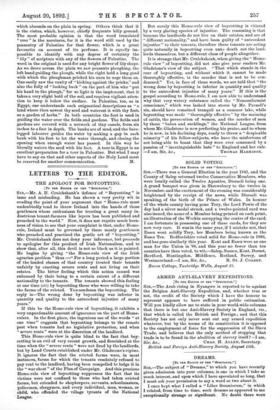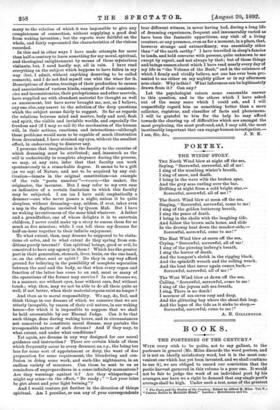DREAMS.
[To THB EDITOR Or TIM " BPS4TAT011:] Sitt,—The subject of "Dreams," to which you have recently given admission into your columns, is one in which I take so much interest, and upon which I have speculated so long, that I must ask your permission to say a word or two about it.
I once kept what I called a " Liber Somniorum," in which I related, from time to time, such dreams as appeared to me exceptionally strange or significant. No doubt there were many to the relation of which it was impossible to give any completeness of connection, without supplying a good deal from waking invention ; but the reports were faithful on the whole, and fairly represented the characteristics of the visions recorded.
In this and in other ways I have made attempts for more than half-a-century to learn something for my moral, spiritual, and theological enlightenment by means of these mysterious visitants, but, I need hardly say, all in vain. I have read everything on the subject which happens to have fallen in my -way (but, I admit, without anything deserving to be called research), and I do not find myself one whit the wiser for it. Descriptions of dreams, tracings of their production to causes and associations of various kinds, examples of their consisten- cies and inconsistencies, their prolepticisms and other marvels, have supplied me with abundant material for thought as well as amusement, but have never brought me, nor, as I believe, any one else, any nearer to the solution of the deep questions which the subject seems fairly to suggest. So far as regards the relations between mind and matter, body and soul, flesh and spirit, the visible and invisible worlds, and especially the freedom and (if I may so call it) the mechanism of the human will, in their actions, reactions, and interactions—although these problems would seem to be capable of much illustration from dreamland, I have strained my eyes, without the smallest effect, in endeavouring to discover any.
I presume that imagination is the faculty to the exercise of which dreaming must be attributed; and, inasmuch as the will is undoubtedly in complete abeyance during the process, we may, at any rate, infer that that faculty can work spontaneously in a remarkable degree. It seems to be a gift (as we say) of Nature, and not to be acquired by any cul- tivation—innate in the original constitution—an example of the rule " poeta nascitur "—iromric—the maker, the originator, the inventor. But I may refer to my own case as indicative of a certain limitation to which this faculty may be subjected. I am (as I have said) emphatically a dreamer—one who never passes a night, unless it be quite sleepless, without dreaming—nay, seldom, if ever, takes even a nap in the daytime unvisited by Queen Mab. But I have no waking inventiveness of the same kind whatever. A father and a grandfather, one of whose delights it is to entertain children, I never could make up a story to amuse them for so much as five minutes; while I can tell them my dreams for half-an-hour together to their infinite enjoyment.
To what extent, then, may dreams be supposed to be visita- tions ab extra, and to what extent do they spring from con- ditions purely internal ? Can spiritual beings, good or evil, be conceived to have any agency in them ? Which has the greater part in their generation, stomach, liver, brain, on the one hand, or, on the other, soul or spirit ? Do they in any way afford ground for believing in the possibility of complete separation between the soul and the body, so that when every organ and function of the latter has come to an end, most or many of the operations of the former may survive ? In our dreams we, in a manner, see without eyes, hear without ears, feel without touch ; why, then, may we not be able to do all these quite as well, if not better, when their material organs exist no longer ?
And then as to moral responsibility. We say, do, feel, and think things in our dreams of which we conceive that we are utterly incapable, by reason of their evil nature, in our waking hours—for which it is impossible to suppose that we shall be held accountable by our Eternal Judge. Can it be that such things, done during waking hours, and in circumstances not conceived to constitute moral disease, may partake the irresponsible nature of such dreams ? And if they may, to what extent, and under what conditions ?
Yet again, are dreams in any way designed for our moral guidance and instruction ? There are certain kinds of them which frequently occur to every dreamer, as, e.g., the being too late for some sort of appointment or duty, the want of due preparation for some requirement, the blundering and con- fusion in doing some work, and such-like nightmares, in an endless variety of sameness. Can these be sent to us as reminders of unpreparedness in a sense infinitely momentous ? Are they warnings against it P Are they whisperings—I might say cries—to the effect, "Be ready ; " "Let your loins be girt about and your light burning "?
And I would venture yet further in the direction of things spiritual. Am I peculiar, or can any of your correspondents
bear different witness, in never having had, during a long life of dreaming experiences, frequent and innumerably varied as have been the fantastic apparitions, any visit of a living creature, or any presence, even as for a moment, in a place, that, however strange and extraordinary, was essentially other than" of the earth earthy." I have travelled in sleep's fancies to lands, and held converse with persons, quite unknown to me except by report, and not always by that; but of those things and beings unseen about which I have read nearly every day of my life in "the Volume of the Book," and in the existence of which I firmly and vividly believe, not one has ever been pre- sented to me either on my nightly pillow or in my afternoon arm-chair. Why is this ? What inferences can be legitimately drawn from it ? Can any?
Let the psychologist return some reasonable answer to this question, and to the others which I have asked out of the many more which I could ask, and I will respectfully regard him as something better than a mere collector, registrar, and classifier of facts and phenomena. I will be grateful to him for the help he may afford towards the clearing up of difficulties which are amongst the most perplexing, the most profound, and, I may add, the most inestimably important that can engage human investigation.—



































 Previous page
Previous page